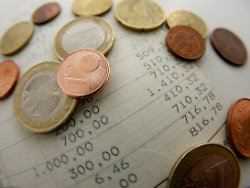Saturday, January 02, 2021
Financial assets at their maximum value
Germans save a record amount
Despite the economic crisis, Germans have financial assets of more than 7.1 trillion euros. More than ever. Because in the pandemic, people save even more than usual. After the crisis, the pendulum could swing back and the money could flow into a consumption boom.
The people in Germany saved like the world champions in the Corona year and are therefore as rich as never before. According to calculations by DZ Bank, which are available to the DPA, the financial assets of private households are likely to have increased by 393 billion euros in 2020 to the record value of 7.1 trillion euros.
DZ Bank economist Michael Stappel largely explains the lush growth of 5.9 percent compared to the previous year with a historically high savings rate. Many people kept their money together for fear of short-time work or unemployment, and the temporary closings in retailing slowed down consumption. The DZ Bank is assuming a record savings rate of 16 percent in 2020, while the BVR banking association even forecast a value of around 17 percent at the beginning of December.
For the year as a whole, private households in Germany put 16 or 17 euros on the high edge of 100 euros of disposable income, according to these calculations. According to figures from the Federal Statistical Office, the highest savings rates to date in Germany were measured in 1991 and 1992 at 12.9 percent each. In 2019 it was 10.9 percent.
100 billion put aside
The stock markets also recovered comparatively quickly from the Corona crash in February and March in 2020. But the increases in the value of stocks and funds only contributed a small part to the increase in private financial assets. "Ultimately, the growth in financial assets in 2020 was almost exclusively due to the extremely high savings resulting from the Corona crisis," says Stappel. Compared to 2019, according to his calculations, private households are likely to put more than 100 billion euros more on the high edge.
"However, most of the funds simply remained in the current accounts and were not invested," writes the economist. When interest rates are low, many investors "do not know what to do with newly released or new investment funds". In the meantime, more than 28 percent of total financial assets – around 2 trillion euros – are permanently "temporarily parked", mainly in the form of sight deposits that can be quickly reallocated if necessary, such as overnight money.
The share, however, experienced a renaissance among Germans who are considered to be risk-averse during the crisis: According to the study, the accumulation of financial assets in the form of shares rose to 28.5 billion euros in the first half of 2020. This is 2.8 times the net investment in the same period of the previous year. Funds and certificates also posted cash inflows. These developments are encouraging, writes Stappel. However, it is too early to speak of "a new equity culture in Germany".
"In the course of 2021, a significant part of the liquid funds that households have parked in their current accounts in 2020 (…) will flow back into private consumption," predicted the new chief economist at DZ Bank, Michael Holstein. As soon as the pandemic situation allows, spending on travel, dining out and cultural events is likely to rise. "We expect a real post-corona boom in the second half of 2021, which will also noticeably push the German economy. At times, the savings rate will then also drop below its long-term average level," said Holstein.
. (tagsToTranslate) Economy (t) Investments (t) DZ Bank (t) Assets (t) Corona crisis
